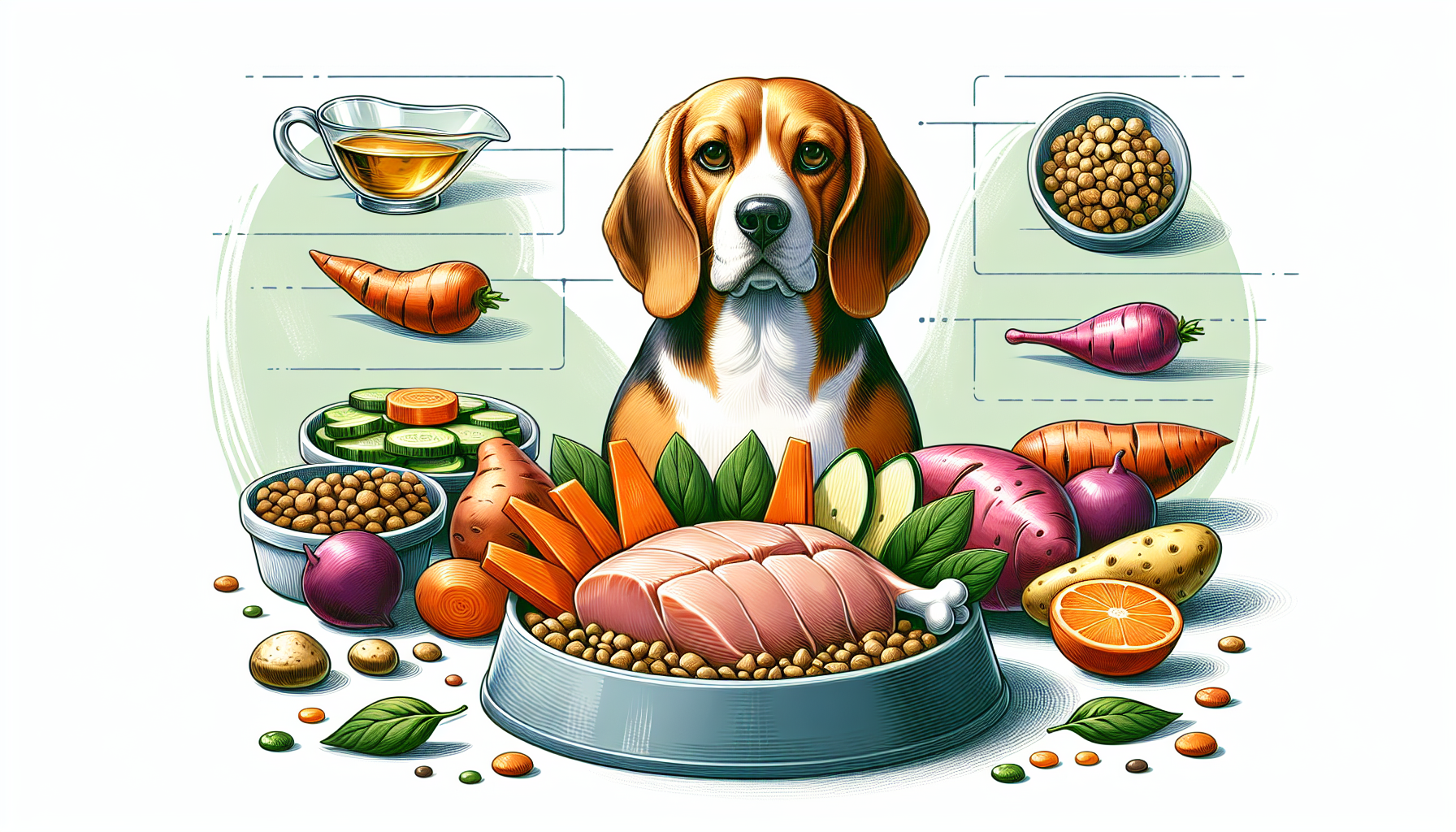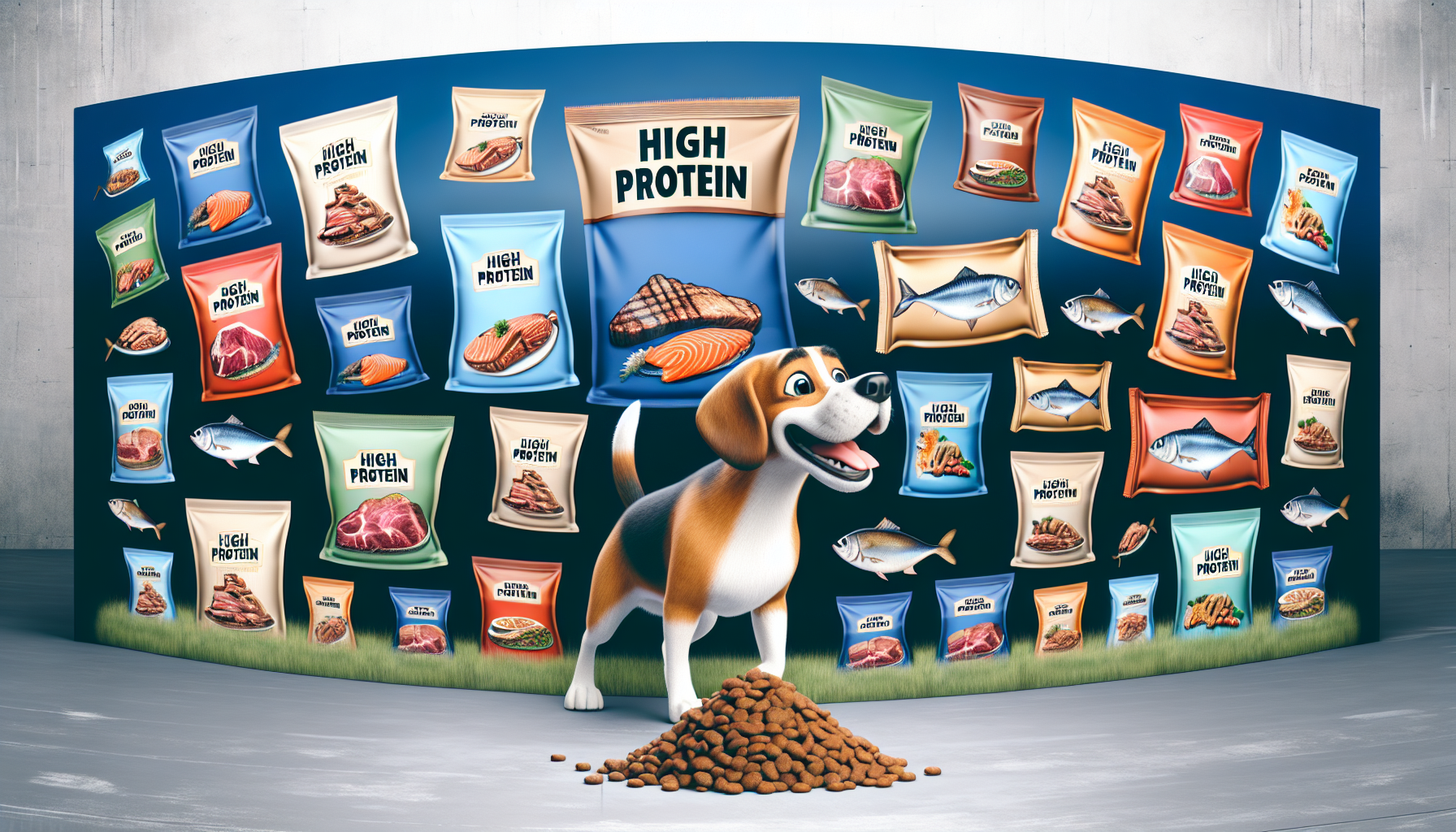Wondering if a high protein diet for beagles is the key to their health and vitality? Discover how boosting your Beagle's protein intake can transform their energy levels and overall wellness. Join us as we explore the benefits and provide essential tips for integrating high protein foods into your Beagle’s diet.
Key Takeaways
- High-quality proteins like real meat, fish, eggs, and cheese are vital for a Beagle's muscle strength and overall health, though they must be balanced with other nutrients for optimal wellness.
- Protein requirements change with a Beagle’s life stage; puppies need vitamin and mineral-rich foods for growth, while adults require protein tailored to their activity levels and health.
- Selecting the right high protein dog food involves prioritizing real meat as the main ingredient and evaluating factors like moisture content, taste, and the nutritional balance of different food types.
Find out how to train your beagle to be the well-behaved pup you desire – Read Free Report
The Essentials of High Protein Diets for Beagles

Image created using AI
Beagles, like other medium-sized dogs, require a balanced diet that includes high-quality protein sources such as real meat, fish, and eggs. These quality proteins provide the essential amino acids that your beagle needs to maintain muscle strength and support their energetic lifestyle. A high protein diet is not just about packing in the protein; it’s also about ensuring the right balance of nutrients for overall health and optimal energy levels.
However, not all proteins are created equal. Incorporating high-quality proteins from reliable sources into your beagle’s diet is fundamental. So, what are some quality protein sources you can trust? And how does protein contribute to your beagle’s growth and maintenance? Let’s delve into these questions in the following subsections.
Identifying Quality Protein Sources
Quality protein sources for Beagles extend beyond just meat. Fish, for example, is a high-quality source of essential amino acids that contribute significantly to a Beagle’s dietary needs. Lean meats, such as pork, are also excellent protein sources and can be a key component in high-quality dog food formulated specifically for joint and skin support in Beagles.
Cheese offers another great source of protein to supplement your Beagle’s main diet. With its essential nutrients vital for growth, maintenance, and overall well-being, adding cheese to your dog’s food can bolster their health. Remember, it’s not about feeding your beagle as much protein as possible, but about choosing quality protein sources to support their unique nutritional needs.
The Role of Protein in a Beagle's Growth and Maintenance
For the healthy growth and development of Beagle puppies, a well-balanced diet rich in quality protein is indispensable. Puppy-specific food for Beagles is designed to cater to their rapid growth and high energy levels, enriched with the essential vitamins and minerals necessary for healthy bone and muscle development.
As your Beagle matures, their dietary needs will evolve. The specific role of protein in the muscle maintenance of adult Beagles may require further information and consultation with a vet. Regular check-ups and nutritional counseling can help ensure that your adult Beagle’s diet continues to meet their unique health profile, supporting them throughout their life stages.
Balancing Protein with Other Nutrients

Image created using AI
A high protein diet doesn’t mean neglecting other essential nutrients. A balanced diet for Beagles should include an optimal mix of:
- Protein
- Carbohydrates
- Fats
- Vitamins
- Minerals
This balance supports essential bodily functions, including tissue repair and energy production, promoting a healthy coat, supporting efficient digestion, and strengthening the immune system.
Beagles have a strong appetite, which can lead them to overeat. Balancing their love for food with a diet rich in nutrients is therefore necessary. This balance is key in supporting a Beagle’s energy levels and preventing excess weight gain. But how exactly can carbohydrates, fiber, and fats support your Beagle’s health? Let’s dive into these essential nutrients in the following subsections.
Carbohydrates and Fiber: Supporting Digestive Health
While carbohydrates are not considered an essential nutrient for dogs, they can still play a beneficial role in your Beagle’s diet. Dogs can digest and use starch, which starts in the small intestine where enzymes break down the glucose units. Diets consisting of 35-40% starch on a dry matter basis have been found to be over 99% digestible by dogs.
Conversely, fiber plays an essential role in maintaining a healthy digestive system in dogs. It aids in normalizing bowel movements and fecal consistency, and can help manage your Beagle’s weight by increasing feelings of fullness and reducing the energy density of the food. Including fiber-rich food in your Beagle’s diet, such as brown rice and vegetables, can support good digestive health and overall well-being.
Fats for Energy and Coat Health

Image created using AI
Fats are a primary energy source for dogs, highly digestible and utilized before proteins and carbohydrates. Including adequate fats in your Beagle’s diet supports skin and coat health, giving a shiny appearance and preventing a dull, scruffy coat and flaky skin.
Fats also aid in the absorption of vitamins A, D, E, and K, regulate inflammation, and improve the taste of dog food. Interestingly, dogs do not experience the same health issues with cholesterol as humans do, allowing them to consume a higher-fat diet without the same risks.
Dogs have a natural preference for a diet where approximately 63% of their daily caloric intake comes from fat. This highlights the importance of including healthy fats, such as those from fish oil and chicken fat, in your dog’s diet.
Portion Control: Preventing Weight Gain in Beagles
As we’ve established, Beagles love to eat. However, to prevent excess weight gain, especially when feeding Beagles a high protein diet where excess protein can turn into fat, portion control is vital. Regularly monitoring your Beagle’s body condition score, including the detectability of ribs and spine, can help determine if their portions need to be adjusted to maintain a healthy weight.
Food portions for puppies should consider their individual activity level, growth rate, and dietary needs, with specific guidelines such as up to 100 grams for puppies below 5 kg. Complementing portion control with physical and mental exercise, like walks and interactive toys, can aid in weight management and provide mental stimulation for your Beagle.
Customizing Your Beagle's Protein Intake
Just as every Beagle is unique, so too are their dietary needs. Factors like weight, breed, and amount of physical activity determine the exact protein intake for a Beagle, making customization necessary. The correct portion of protein for Beagles varies individually, with metabolism and energy requirements influencing the amount needed.
As Beagles grow and age, their dietary requirements evolve. Puppy Beagles and adults have distinct dietary requirements, necessitating different protein intake levels. Seeking nutritional counseling can help ensure a protein intake that is well-balanced and tailored to the Beagle’s specific age, size, and activity level.
Selecting the Best High Protein Dog Foods for Beagles

Image created using AI
Choosing the right dog food for your Beagle amid a vast market can be overwhelming. A high-quality dog food should prioritize real meat as the primary ingredient and minimize unnecessary fillers. Here are some top high-protein dog food brands recommended for Beagles:
- Nom Nom Turkey Fare
- Redbarn Air Dried Fish
- Select Freshpet Grain Free Chicken Recipe
- Primal Freeze-Dried Nuggets for Dogs – Lamb Formula
- Open Farm Small Breed Grain-Free
- Canidae ALS Chicken Meal and Rice
- Taste of the Wild Wetlands Formula
- Merrick Grain Free Puppy Real Chicken
- Acana Regionals Meadowland
It's crucial to focus on quality and nutrition when selecting your dog's food to ensure they remain healthy and content.
When choosing between dry, wet, fresh food, or a raw diet, understanding the benefits and drawbacks of each type can help you make an informed decision. Let's explore these options further in the subsequent sections.
Dry Dog Food Options
Dry dog food is favored by many Beagle owners for its convenience and affordability. Additionally, it helps maintain dental health due to its mild abrasive effect, which can reduce plaque buildup. However, one drawback is its lower moisture content compared to wet food, which may impact hydration levels.
Here are some recommended high-protein dry dog food options for Beagles:
- Canidae ALS Chicken Meal and Rice
- Open Farm Small Breed Grain-Free
- Taste of the Wild Wetlands Formula
These brands offer a well-rounded diet with high-quality protein, essential carbohydrates, and healthy fats, making them excellent choices for your Beagle’s nutritional needs.
Wet Food Choices
Wet dog food offers several benefits for Beagles, including higher moisture content which aids in hydration and enhanced palatability, making it an excellent choice for picky eaters. Here are some recommended wet food options:
These products are rich in quality proteins and essential nutrients, making them nutritious options for your Beagle.
However, despite its advantages, wet food is typically more expensive and less convenient to store compared to dry food. Additionally, without proper dental care routines, wet food can contribute to dental problems. It’s essential to maintain good oral hygiene practices and weigh these considerations when selecting the best food option for your Beagle.
Fresh Food and Raw Diet Considerations
Fresh food and raw diet options offer a nutrient-rich alternative for your Beagle, featuring options like:
These diets are typically highly palatable and can provide health benefits due to the freshness and quality of the ingredients.
However, there are considerations to keep in mind when opting for a raw diet:
- Potential Contamination: Risks of bacterial contamination are higher with raw foods.
- Nutritional Imbalances: Ensuring a balanced diet with raw food can be challenging.
- Bone Consumption Risks: Bones can pose a threat to dental and digestive health.
Due to these risks, it's essential to consult with a veterinarian or a pet nutrition expert before transitioning your Beagle to a fresh food or raw diet to ensure their safety and health.
Healthy Treats to Complement a High Protein Diet
Beyond their regular meals, Beagles also love treats! But treats should not exceed 10% of an adult Beagle’s total daily caloric intake. Therefore, it’s crucial to choose treats that are not just tasty but also healthy and nutrient-rich to complement their high protein diet.
Healthy treats for Beagles can include options like Dogsee Chew’s Puffies, which are high in protein and calcium, yet low in fat, helping to maintain a healthy weight. Remember, treats are not a substitute for a well-balanced diet, but they can certainly add a bit of variety and fun to your Beagle’s meal times!
Transitioning to a High Protein Diet
To minimize digestive issues during the dietary change, transitioning your Beagle to a high protein diet should be done gradually. For most dogs, this transition typically takes about a 4-day period following a specific guide.
For beagles with sensitive stomachs, the transition period to a high-protein diet may need to be extended to 7-10 days. During this period, it’s important to monitor your Beagle’s response to the new diet and make adjustments as necessary. It’s important to remember that each Beagle is unique. What works for one may not work for another.
Monitoring Your Beagle's Health on a High Protein Diet
Once your Beagle is on a high protein diet, keeping a watchful eye on their dog’s health becomes important. Regular veterinary check-ups are crucial to monitor how the diet is affecting your Beagle’s health. These check-ups can provide valuable insights into your Beagle’s health and allow for personalized dietary adjustments if needed.
Look out for any signs of food allergies or intolerances that may arise with a high protein diet. If your Beagle experiences any adverse reactions, such as skin allergies or digestive issues, it’s important to consult your vet immediately. Your vet can help determine the cause of these symptoms and make necessary changes to your Beagle’s diet.
Addressing Common Concerns About High Protein Diets
We would like to address some common concerns about high protein diets. One of these is the presence of fruits and vegetables in pet food. While fruits and vegetables can provide important nutrients, their presence in pet food does not automatically make it healthier. It’s essential to examine the nutritional contribution of each ingredient for the true beagle health benefits they provide.
Another concern lies in the presence of byproducts in pet food. Contrary to popular belief, these byproducts are not waste but nutrient-rich organs that Beagles can easily digest and gain nutrition from. It’s crucial to look beyond the label and consider the nutritional value of each ingredient to ensure your Beagle is getting the best dog food for their needs.
Summary
Crafting a high protein diet that suits your Beagle’s unique lifestyle and health needs is more than just a feeding routine—it’s a way to enrich their life and spirit. When selecting from dry, wet, or fresh food options, always prioritize high-quality ingredients that will nourish them from the inside out. Keep an eye on their health through regular vet check-ups and be alert to any signs of food sensitivities. By balancing proteins, carbohydrates, fats, and essential nutrients thoughtfully, you're not just feeding your Beagle—you're giving them the vitality to leap, play, and thrive each day.
Frequently Asked Questions
What are some quality protein sources for Beagles?
Quality protein sources for Beagles include real meat, fish, eggs, and cheese. These foods provide essential nutrients for your Beagle's health and wellbeing.
How can carbohydrates and fiber benefit my Beagle's health?
Carbohydrates provide energy, while fiber aids in maintaining a healthy digestive system and managing weight, which can benefit your Beagle's overall health.
What role do fats play in my Beagle's diet?
Fats are essential for your Beagle's energy, skin and coat health, and vitamin absorption. They play a crucial role in your Beagle's diet.
How should I transition my Beagle to a high protein diet?
To transition your Beagle to a high protein diet, do so gradually over a 4-10 day period to minimize digestive issues.
How can I monitor my Beagle's health on a high protein diet?
To monitor your Beagle's health on a high protein diet, it's important to schedule regular veterinary check-ups and watch for any signs of food allergies or intolerances. This will help ensure your Beagle's well-being.
Learn how to train your beagle to be the well-behaved dog you desire –> Access our Free Report
Shop for beagle-themed products and gifts that beagle enthusiasts will love.

